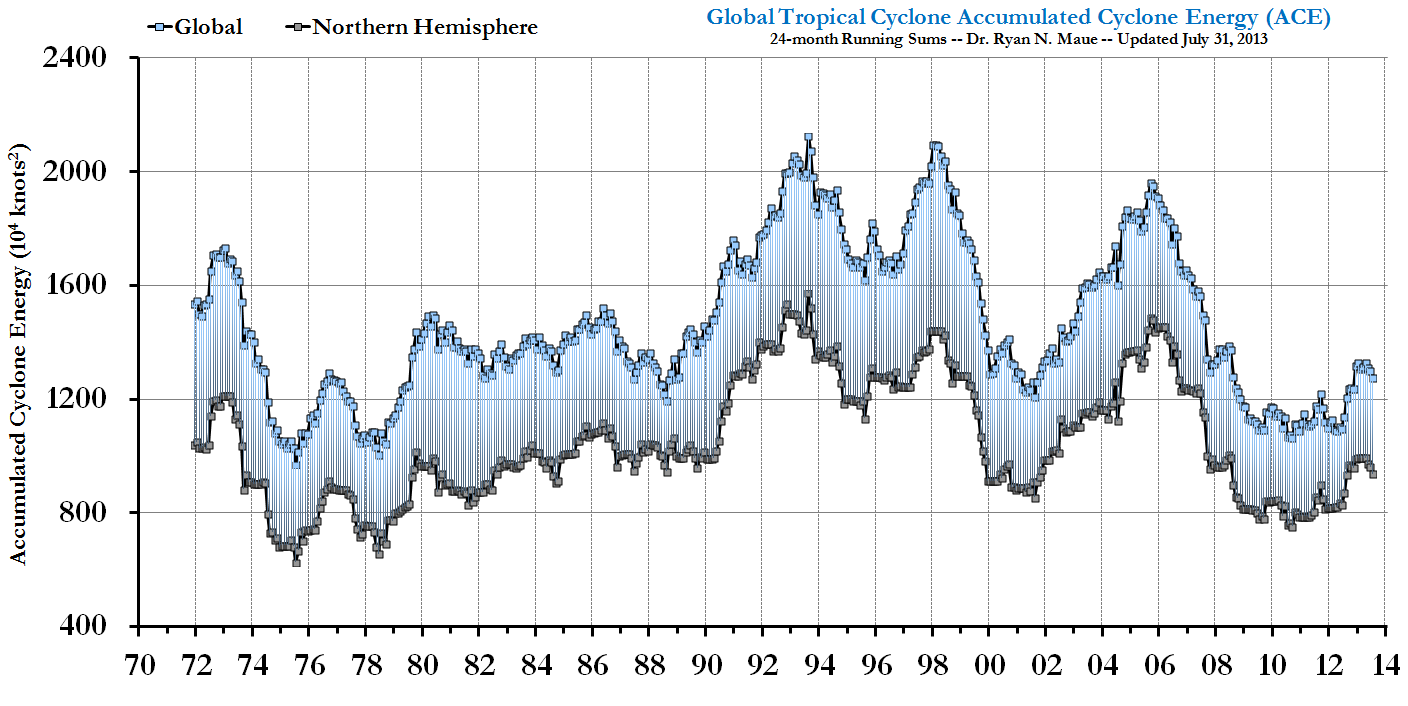 Click on image for larger view
Click on image for larger viewNo, this is not a chart of the Dow Jones Industrial Average, which has been doing pretty well (relatively speaking) for most of this week. This is a chart of the aggregate, global intensity of hurricanes since 1974. This chart is from Climate Audit website, where we learn that, "Global hurricane activity has decreased to the lowest level in 30 years." Click image for a larger view. The chart displays data using "a well-accepted metric called the Accumulated Cyclone Energy index or ACE for short."
Remember when the "consensus" was that global warming would make hurricanes worse? For example,
According to the 2007 Fourth Assessment Report of the Intergovernmental Panel on Climate Change (IPCC-AR4), it is “more likely than not” (better than even odds) that there is a human contribution to the observed trend of hurricane intensification since the 1970s. In the future, “it is likely [better than 2 to 1 odds] that future tropical cyclones (typhoons and hurricanes) will become more intense, with larger peak wind speeds and more heavy precipitation associated with ongoing increases of tropical [sea surface temperatures].”And again:
The Effect of Global WarmingFinally:
Two factors that contribute to more intense tropical cyclones-ocean heat content and water vapor-have both increased over the past several decades. This is primarily due to human activities such as the burning of fossil fuels and the clearing of forests, which have significantly elevated carbon dioxide (CO2) levels in the atmosphere. CO2 and other heat-trapping gases act like an insulating blanket that warms the land and ocean and increases evaporation.
[A]re storms getting stronger, and if so, what's causing it? According to a new paper in Nature, the answer is yes — and global warming seems to be the culprit.But now the consensus has evaporated. Last month the NOAA announced,
“There is nothing in the U.S. hurricane damage record that indicates global warming has caused a significant increase in destruction along our coasts.”Original NOAA paper here. To be accurate, the paper focuses on the dollar amounts of hurricane-induced damages rather than the meteorological intensity, but it does specifically rebut the notion that global warming has increased intensities and this increased losses. In fact, hurricane intensities have actually decreased since the mid-19th century:

So why the record low intensities? Climate Audit explains:
During the past 2 years +, the Earth's climate has cooled under the effects of a dramatic La Nina episode. The Pacific Ocean basin typically sees much weaker hurricanes that indeed have shorter lifecycles and therefore — less ACE . Conversely, due to well-researched upper-atmospheric flow (e.g. vertical shear) configurations favorable to Atlantic hurricane development and intensification, La Nina falls tend to favor very active seasons in the Atlantic (word of warning for 2009). ... Through March 12, 2009, the Southern Hemisphere ACE is about half of what's expected in a normal year, with a multitude of very weak, short-lived hurricanes. All of these numbers tell a very simple story: just as there are active periods of hurricane activity around the globe, there are inactive periods, now for almost 3 years.And I'll give them the last word:
Under global warming scenarios, hurricane intensity is expected to increase (on the order of a few percent), but MANY questions remain as to how much, where, and when. This science is very far from settled. ... The perceptible (and perhaps measurable) impact of global warming on hurricanes in today's climate is arguably a pittance compared to the reorganization and modulation of hurricane formation locations and preferred tracks/intensification corridors dominated by ENSO (and other natural climate factors). Moreover, our understanding of the complicated role of hurricanes with and role in climate is nebulous to be charitable. We must increase our understanding of the current climate's hurricane activity.
No comments:
Post a Comment
To combat spambots and trolls, comments are moderated. No, I don't like it, either, but such is the world.